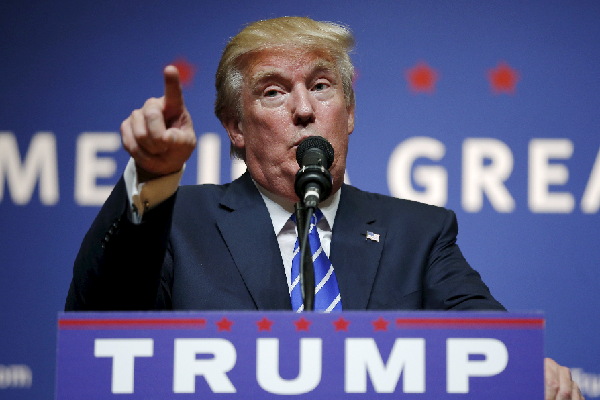China-bashing poisons US politics
- By Mitchell Blatt
 0 Comment(s)
0 Comment(s) Print
Print E-mail China.org.cn, August 27, 2015
E-mail China.org.cn, August 27, 2015
|
|
|
U.S. Republican presidential candidate Donald Trump speaks at a campaign rally in Hampton, New Hampshire, August 14, 2015. |
Donald Trump's rise as leading Republican presidential nominee for 2016 is fueled by anti-foreigner zealotry. All of America's problems, he says, can be boiled down to excess immigration and trade with developing countries. So, what does this mean for China?
While anti-foreign sentiment is nothing new in American politics, it's more intense now than for some time.
Economic relations between China and America are a big issue, with some candidates expressing distrust of America's largest trade partner. Trump often says China is "killing us" and "China comes over here and they dump all their stuff." He proposes increasing taxes on imported goods.
Trump also accused China of "manipulating" its currency, a charge Mitt Romney leveled in 2008. The latest charges of "manipulation" come after China's currency declined in August after China changed its currency peg to more accurately reflect market conditions.
After that, Trump talked of a Chinese "devaluation," even though the reality is that the move was actually a step towards less government control and the market reaction suggests the Renminbi was somewhat overvalued.
The current short-term decline, however, should not mask the fact it has risen 40 percent since 2005, and even the trade-weighted exchange rate is much higher than 2014. And we can't ignore the fact the dollar is appreciating - it's been at a five year high against the Euro for some time.
Democrat Hillary Clinton also said China is "dumping products on the American market." Some of this language is for show, a vote-getter, and not an indication of what any of these politicians would actually do in office. For example, President Obama pledged to renegotiate NAFTA, America's trade agreement with Canada and Mexico, during his 2008 campaign, but has never tried.
While there are some legitimate disagreements between the U.S. and China, both countries reap benefits from economic cooperation. China doesn't "dump" stuff as if Americans were passive victims. Rather, American companies - including the makers of Trump's line of apparel - seek out China to manufacture their goods, and American consumers buy them.
Many products now have global supply chains. Foxconn is famously associated with iPhones, but they are actually only put together in China, with components manufactured by many companies around the world. A 2007 study by researchers at the University of California, Irvine found that American companies and workers actually retain over 50 percent of the retail value of an iPod.







Go to Forum >>0 Comment(s)